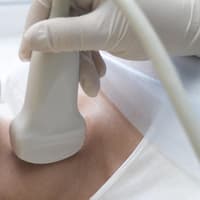
Do you live in northern or southern Germany? The further away from the coast, the less iodine there is in the soil and grain, which is why people with goitre are more common in the south. Many take iodine tablets as a preventative measure. But this is not always recommended. This is because the thyroid gland, with its many tasks and functions, reacts sensitively to iodine deficiency - but also to iodine excess.
Iodine: check your levels
An excess of iodine can be associated with Hashimoto's thyroiditis, an autoimmune disease of the thyroid gland. 10 percent of Germans suffer from it. To be able to clearly determine whether you have an iodine deficiency, you should therefore have your thyroid levels checked regularly by your doctor.
Goitre on the neck and lump formation
If there is an iodine deficiency, the thyroid gland enlarges to form a goitre. In this way it tries to compensate for the deficit. If the growth is uniform, it is referred to as a diffuse goitre. If the thyroid gland enlarges regionally, we are dealing with thyroid nodules (nodular goiter) - this is the more common case. Around 20 million people in Germany are affected. The enlargement can be felt or seen on ultrasound. In both cases, the enlargement of the organ becomes visible from the outside once it reaches a certain volume. A goitre is treated with medication, treatment with radioactive iodine (radioiodine therapy) or surgery on the thyroid gland.
Symptoms of iodine deficiency
Iodine deficiency is manifested by tiredness and weakness, chills and a feeling of a lump in the throat. The need for iodine varies: adults need an average of 200 micrograms a day, pregnant women need significantly more.
The German Nutrition Society recommends the following amounts of iodine per day:
- 25 to 51 years 200 µg/day
- from 51 years 180 µg/day
- Pregnant women 230 µg/day
- Breastfeeding mothers 260 µg/day
How can you prevent an iodine deficiency?
Eat more fish! For example, eat saltwater fish twice a week (sea bream, eel, halibut, herring) or products with seaweed (wakame salad or sushi rolls with nori, the seaweed leaf) and season your food with iodized salt, i.e. salt with added iodine - you can buy it everywhere. Patients with thyroid glands, pregnant women and breastfeeding mothers should discuss their individual values with their doctor. However, too much salt is not recommended for high blood pressure, which is why tablets are usually prescribed for iodine deficiency.






